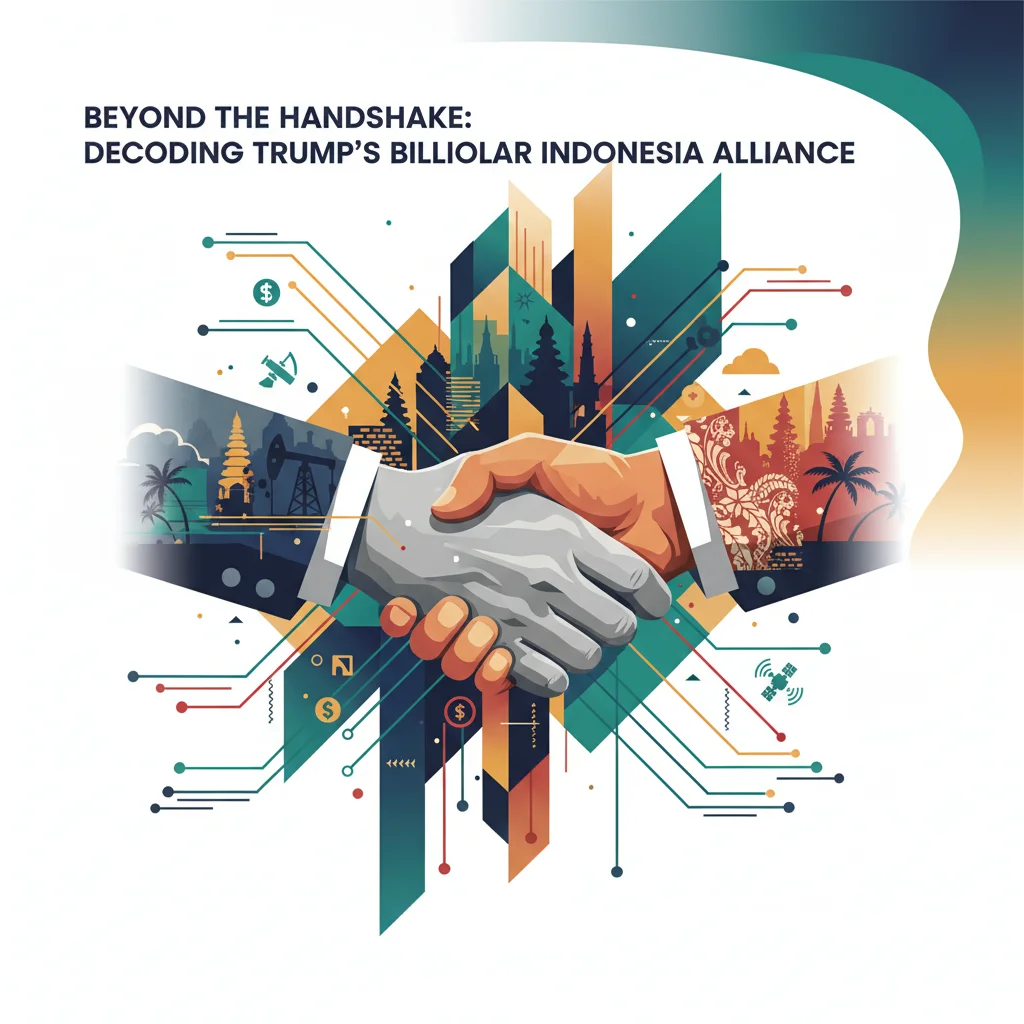
Beyond the Handshake: Decoding Trump’s Billion-Dollar Indonesian Alliance
The Handshake Seen ‘Round the World
In the world of high-stakes global business and politics, sometimes the most revealing moments are the ones not meant for public consumption. A recently surfaced hot-mic moment featuring former US President Donald Trump and Indonesian billionaire Hary Tanoesoedibjo did more than just create a fleeting headline; it pulled back the curtain on one of the most significant, and potentially controversial, business partnerships bridging Washington and Jakarta. This wasn’t just a casual chat; it was a glimpse into the intricate dance of power, politics, and capital that defines the modern global economy.
The relationship between Trump and Tanoesoedibjo is a masterclass in the convergence of real estate development, media influence, and political ambition. It involves two luxury resorts in Indonesia, valued in the hundreds of millions of dollars, and a web of connections that could have profound implications for international investing, geopolitical dynamics, and the very nature of post-presidential enterprise. To understand the future of this alliance, we must first understand the man who stands as Trump’s key partner in Southeast Asia’s largest economy.
Meet Hary Tanoesoedibjo: The “Trump of Indonesia”
Long before his association with Donald Trump, Hary Tanoesoedibjo had already carved out a formidable empire in Indonesia. Often dubbed the “Trump of Indonesia,” the parallels are striking. Tanoesoedibjo is the founder of MNC Group, a sprawling media and real estate conglomerate that holds immense sway over the nation’s 270 million people. His portfolio includes national television stations, print media, and extensive property holdings, giving him a platform to shape public opinion and business landscapes alike.
Like Trump, Tanoesoedibjo has leveraged his business success into a political career. He founded his own political party, Perindo, and has made unsuccessful runs for vice-president. His political aspirations, combined with his media dominance, make him a uniquely powerful figure. For investors monitoring the Indonesian stock market, MNC Group and its subsidiaries are key players whose fortunes are closely watched. Understanding his influence is crucial to grasping the strategic value he represents for a partner like the Trump Organization.
The synergy is clear: Tanoesoedibjo provides local expertise, political connections, and capital, while the Trump brand brings global recognition and a veneer of luxury that appeals to an affluent international clientele. It’s a partnership built on mutual ambition, and it’s taking physical form in two of Indonesia’s most coveted locations.
The UK's Productivity Puzzle: Why Stagnation Threatens Your Portfolio and the Economy
The Crown Jewels: Trump’s Indonesian Mega-Projects
At the heart of this alliance are two ambitious real estate developments intended to redefine luxury in the region. These are not just hotels; they are sprawling, multi-faceted resorts that represent a significant bet on the future of Indonesian tourism and the broader Asian economy.
The Trump Organization has licensed its name and will manage these properties, which are being developed and financed by Tanoesoedibjo’s MNC Group. This arrangement minimizes Trump’s direct financial risk while allowing him to profit from his globally recognized brand. A closer look reveals the scale of their shared vision.
| Project | Location | Key Features | Strategic Importance |
|---|---|---|---|
| MNC Lido City | West Java (near Jakarta) | A 3,000-hectare “entertainment and lifestyle resort” featuring a Trump-branded hotel, residences, a golf course, and a theme park. Envisioned as a “world-class destination.” | Targets the wealthy domestic market from Jakarta and aims to become a government-designated Special Economic Zone (SEZ), offering significant tax and regulatory advantages (source). |
| Trump International Resort, Bali | Tanah Lot, Bali | A super-luxury hotel and residential development built on the site of the existing Nirwana Bali Resort, featuring panoramic views of the iconic Tanah Lot temple. | Leverages Bali’s global reputation as a premier tourist destination, aiming for the highest end of the international luxury travel and real estate market. |
These projects are more than just a business deal; they are a statement. For Tanoesoedibjo, they are legacy projects that elevate his portfolio to a global standard. For Trump, they represent a significant part of his post-presidency business strategy, demonstrating the enduring international appeal and commercial power of his brand.
Looking ahead, the implications of a potential 2024 Trump presidency are immense. If he returns to the White House, these Indonesian projects would instantly transform from private business ventures into assets with significant geopolitical weight, raising a host of ethical questions about conflicts of interest. Furthermore, as these resorts are developed, the integration of advanced financial technology will be key. Imagine a future where property shares in Lido City are tokenized and traded on a blockchain, or where the entire resort ecosystem runs on a seamless, proprietary fintech payment platform. This is the next frontier where big real estate meets high tech, and this partnership is perfectly positioned to explore it.
The Blurring Lines of Power and Profit
The core of this story lies at the intersection of political power and private enterprise. The partnership was inked before Trump’s presidency, but it evolved and gained new significance during his time in office and beyond. Critics point to the potential for conflicts of interest, where the business dealings of a sitting or former president could influence, or appear to influence, foreign policy.
For instance, Tanoesoedibjo attended Trump’s 2017 inauguration, a symbol of his access to the highest levels of US power (source). This access is invaluable in the world of international finance and development. It signals to local authorities, international banking institutions, and potential partners that a project has powerful backing. This “political capital” can be more valuable than financial capital, helping to smooth regulatory pathways and secure favorable terms.
The designation of Lido City as a Special Economic Zone (SEZ) by the Indonesian government is a prime example. While not directly attributable to the Trump connection, the prominence of the partnership certainly didn’t hurt its case. SEZs offer benefits like tax holidays and streamlined permits, dramatically improving the project’s financial viability and demonstrating the tangible economic benefits of such a high-profile alliance.
The Kardashian Premium: Deconstructing the Billion-Dollar Math Behind Skims' Valuation
Implications for the Modern Investor
For finance professionals, business leaders, and investors, the Trump-Tanoesoedibjo saga offers several critical takeaways about navigating the complexities of emerging markets and the global political landscape.
- Political Risk is a Double-Edged Sword: Investing in politically connected enterprises can unlock immense opportunities and fast-track development. However, it also introduces significant risk. A change in government, a shift in political winds, or a public scandal can jeopardize an entire investment. Due diligence must extend beyond financial statements to a deep understanding of the political economics at play.
- Brand Equity as a Financial Asset: The Trump Organization’s model of brand licensing in real estate demonstrates the power of intangible assets. A strong global brand can command premium pricing, attract partners, and reduce capital outlay. This is a crucial lesson in the power of branding in modern investing and corporate strategy.
- Emerging Markets Require Local Champions: For any multinational corporation entering a complex market like Indonesia, a powerful local partner is indispensable. Tanoesoedibjo provides not just capital but also invaluable local knowledge, a vast media network for promotion, and the political leverage to navigate the intricacies of the local bureaucracy.
Ultimately, this partnership underscores a fundamental truth of 21st-century capitalism: the lines between business, media, and politics are not just blurred; they are often erased entirely. Success in this environment requires a sophisticated understanding of how these forces interact and how to leverage them—or at least, how to protect investments from their volatility.
The Shadow Portfolio: Is the Insurance Industry's Bet on Private Credit a Ticking Time Bomb?
A Partnership to Watch
The hot-mic moment may have been an accident, but it illuminated a deliberate and strategically crafted alliance. The relationship between Donald Trump and Hary Tanoesoedibjo is more than a business deal; it is a symbol of a new era of globalized, politically-infused commerce. As their mega-projects in Bali and Lido City rise, they will stand as monuments to this powerful partnership.
For the world of international finance, the success or failure of these ventures will be a bellwether for the future of branded real estate and the ongoing dance between global capital and local power. Whether you are an investor, a business leader, or simply an observer of the global stage, this is a handshake—and a partnership—worth watching closely.


